In Belize… dredging sand from a living reef. This shouldn’t happen. As if the fishing gods agreed, the barge ended up stuck on the reef it was smothering.
You can do better, Belize.
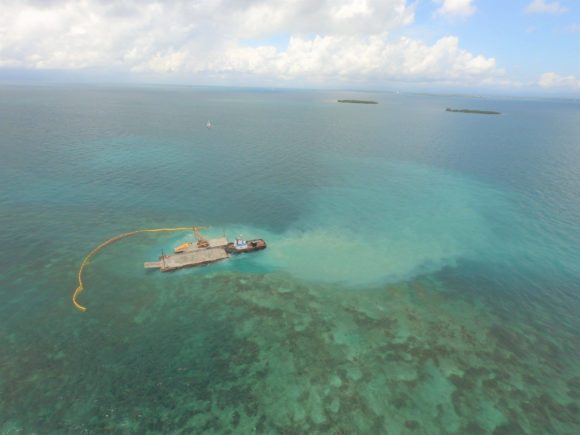
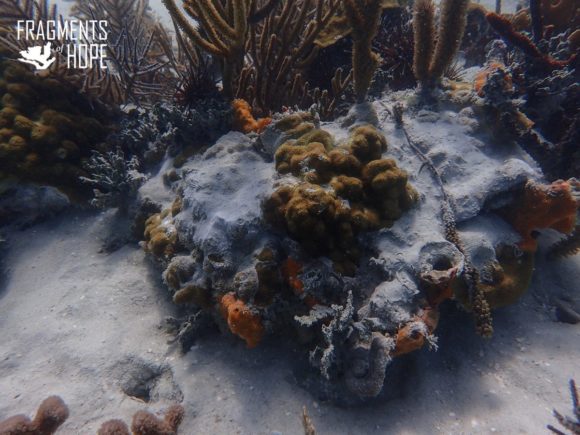
Coral being killed

In Belize… dredging sand from a living reef. This shouldn’t happen. As if the fishing gods agreed, the barge ended up stuck on the reef it was smothering.
You can do better, Belize.


Coral being killed
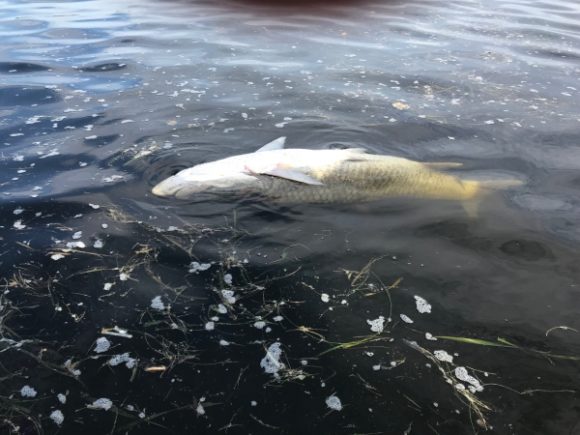
Approximately 140-pound tarpon photographed by Capt. Tommy Locke outside Cayo Costa
Things are not going well in Southwest Florida… not well at all. Below is BTT’s press release about what they are seeing.
—
Once again, Florida’s fisheries are suffering from the legacy of long-time mismanagement of Florida’s water resources. Southwest Florida is plagued by an unprecedented red tide that is causing kills of gamefish. Reports from those on the water estimate that tens of thousands of snook are dead – all of them adults in the peak of spawning season. Breeding-size redfish, as well as tarpon, which usually seem to avoid red tide, are also being reported dead. The ongoing red tide is a sign of the ‘new normal’ in Southwest Florida because too many nutrients are entering Florida’s estuaries and coasts due to water mismanagement. Here are the facts:
The excess nutrients in Southwest Florida waters are from two sources. First, they are from the high-nutrient water from Lake Okeechobee that is discharged into the Caloosahatchee River as part of water mismanagement in South Florida (the same mismanagement that is killing the Everglades and St. Lucie River). Second, the phosphate mining industry in the Charlotte Harbor watershed produces runoff high in phosphorous, which feeds red tide and other plankton organisms.
Southwest Florida is home to Boca Grande Pass, part of Charlotte Harbor, the Tarpon Capitol of the World. Tarpon gather in Boca Grande Pass and Charlotte Harbor during May and June in association with spawning. It is likely that this red tide will negatively impact tarpon spawning.
Charlotte Harbor is also home to an amazing snook and redfish fishery. During summer months, snook spawn in passes and along beaches. This red tide is impacting spawning snook directly, which will impact the region’s snook population.
This red tide event is the new normal unless the state’s water management policies are changed. This is about the future of Florida’s $8 billion saltwater recreational fishery.
We urge readers to contact their political representatives at the local, state, and federal levels and tell them that policy change is needed immediately.
Bristol Bay is about salmon and outstanding trout fishing and the wild Alaska of legend.
It’s one big flaw is a lack of bonefish. Lesser flaws include a lack of clear, warm, tropical water, a lack of palm trees and no conch.
Most bonefish aren’t even in the United States. They live, mostly, in other countries. They live in other countries with smaller economies, less robust infrastructure (which the Fyre Festival folks found out the hard way) and, in most cases, much less successful douchebags. The Bahamas, for example, are criss-crossed with ill-fated real estate ventures which spring up, only to be slowly reclaimed by the scrub after the investors have been sufficiently fleeced and the bankruptcy has been declared.
These bonefishful places tend to be tourist economies and since their main product is natural beauty, they tend not to allow their nature to be destroyed (too much) in the name of profit.
Bristol Bay is not so lucky. The Pebble Mine is again on the table, thanks to the Trump Administration.
Here is a link to the video, which won’t embed for me for some reason.
https://vimeo.com/122842334
Below is a movie put together by Mark Titus, along with some of his words. Check it out.
No Pebble Mine.
Friday, May 12th, news broke that the Trump administration paved the way for the Pebble Limited Partnership to restart its quest to dig North America’s largest open pit copper mine – directly in the headwaters of Bristol Bay’s vast wild salmon runs.
The EPA and Pebble’s settlement agreement was a backroom deal brokered between EPA Administrator Scott Pruitt and Pebble. The EPA’s own peer-reviewed science was not taken into consideration, nor the requests from Bristol Bay’s Native Communities, fishermen, and hunters and anglers to uphold the EPA’s Proposed Determination.
Bristol Bay provides 14,000 American jobs and 1.5 billion dollars to the American economy with the 30 – 60 million wild sockeye salmon that return there each summer.
Please take action and call EPA Administrator, Scott Pruitt to tell him compromising an irreplaceable ecosystem, a fully sustainable food supply and some of the greatest sport fishing on earth is unacceptable.
The Office of EPA Administrator, Scott Pruitt: 202.564.4700
For a dive into what’s at stake in Bristol Bay, watch the award winning documentary The Breach for the next five days for free through this link here: THE BREACH
To take further action and to stay informed visit: SAVE BRISTOL BAY
For the latest News: LATEST NEWS
Join The Breach community by liking The Breach Facebook page here:
The Bahamas are full of unfulfilled, if not outright broken, promises. An arial view of almost any island will confirm as much. So many folks have blown through and made grand promises of economic security and revolution. Every paved road in a fantasy real estate development tells the tale.
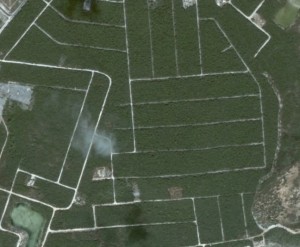
Exuma
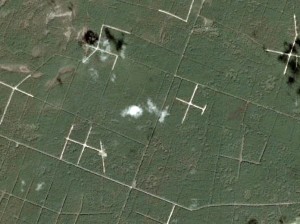
Andros
I have to wonder if the International Development Bank sees something similar when it looks at its own investments in the fly fishing community in the Bahamas.
Turns out they invested in a program, to be led by the BFFIA, to “Support the economic empowerment of fly fishing guides.” The project was approved in December of 2014, although very little, if any, of the project seems to have been carried out.
Oddly, this BFFIA project was focused only on Andros, coincidentally the home of BFFIA President and Head Bahamian Snake-Oil Salesman.
Goal:
The general objective of the project is to enhance the skill sets and business acumen of the Andros fly fishing guides and their families while sustaining the island’s natural ecosystem.
There was about $140,000 available for the project and only about $34,500 was reported to be spent.
This project was supposed to include a market survey… ya know… like BTT did, and it appears the BFFIA at least made a go of it, as they inflated the value of the industry from 2x-4x to suit their politics, but the report is not available on the website.
Maybe some of the projects milestones were met, but it sure doesn’t look like it. I don’t have a crystal ball that reveals such details, just the project page, but it sure looks like the IDB’s 2014 investment produced some shite returns in 2017, the year their project was supposed to be wrapped up.
Go to the Bahamas though… just go to one of the places that fought for all anglers.
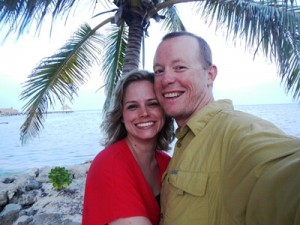
Honeymooners, Belize, 2012.
Belize is not a big country. It’s 330,000 people, plus or minus, makes it smaller in population than the city I work in, Oakland, which has some 400,000 residents. In terms of economics, the city of Oakland has an income per capita of about $32K, give or take, while the income per capita for the whole nation of Belize is just over $7,000.
So, it is easy to guess some of the things Belize does not have. There are some things Belize has in spades, however. Belize has in Mayan ruins what it lacks in Walmarts. The one big, big thing Belize has is a barrier reef. In fact, the Belize Barrier Reef Reserve System has been a UNESCO World Heritage Site since 1996. It is massive. It is a treasure. It is probably the lifeblood of the Belizian economy, accounting for about 12% of GDP.
If you were to make of list of activities which could really mess up a barrier reef system, you might put offshore oil drilling high on that list. Cynics would be unsurprised to hear the government of Belize has moved in that direction, giving the green light to start oil exploration off the coast of Belize.
I mean… why would you do that? That’s not a real question. We all know why. It is money and greed and the power someone(s) might be able to accumulate in a country with a population smaller than the city of Oakland.
Belize… I hope you don’t do it. I hope you build on your assets and don’t lose them under a slick of oily greed and shortsightedness.
Belize… I need you to be Belize.
I’m just going to leave this here for y’all to peruse at your leisure. Here are a few of the stories about the new regulations in the Bahamas, set to go into effect on Jan. 9, despite the whole nation being woefully unprepared for the mechanism the law lays out.
Abaco Guides Fear ‘Irreparable Harm’ Via New Regulation
New Regulations a “Slap in the Face” says, Abaco Fly Fishing Guides Association
Fly Fishing Penalties ‘Draconian, Hostile’
Bahamas Moves to Protect Fly Fishing Industry
Fly Fishing Rules ‘One Of Most Important Laws Since Majority Rule’
Just an aside… the Bahamian government websites (like this) where people would actually go to see what the regulations are do not, in fact, have any of that information up yet… and it is supposed to all start on Monday.
I saw some photos yesterday of some mangroves being ripped up near Fresh Creek in Andros.
Mangroves, as most folks here would know, are vital. They are the nurseries for juvenile fish. They hold the shoreline in place when the big storms come through. They are host to crabs and shrimp and all manner of wild things.
You shouldn’t rip out mangroves because you want to put in a fuel station.
But… if the reports are true, that’s exactly what our good ole pal Prescott Smith is doing down in Andros. Yup, that Knight of Conservation appears to be ripping out mangroves. And yes, that’s a bonefish flat right in front of the ripped out mangroves.
It boggles the mind.
The number one threat to bonefish is not angler pressure or illegal netting or pollution. The number one threat to bonefish is habitat loss.
There is a lot of habitat in Andros. Miles and miles and miles of it, square miles. It is the biggest nursery in the Caribbean. It is only that good because it is mostly intact. Bonefish won’t be lost by a few huge devastating blows, but by a thousand little cuts. This is one such little cut.



It pains me to have to write this, to keep having to write these posts about what everyone should know are just horrible, horrible ideas.
There is a new draft of the regulations out, this time put out by the Ministry of Fisheries and since they have pretty much had a monopoly on the worst ideas, you can imagine where this is going.
This does not ban DIY, so if that’s all you care about, you are in the clear… kind of. However, if you mis-calculate and end up committing an “offense,” well, the fine is up to $5,000 with the added possibility of three months in Bahamian jail. Doesn’t that feel welcoming?
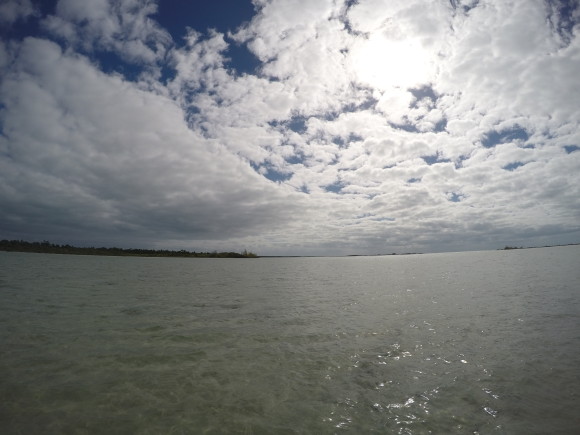
Illegal
You can still rent a boat to go fish, as long as you are the only one on it. A boat with two people required a guide, or, $5,000 and 3 months in jail.
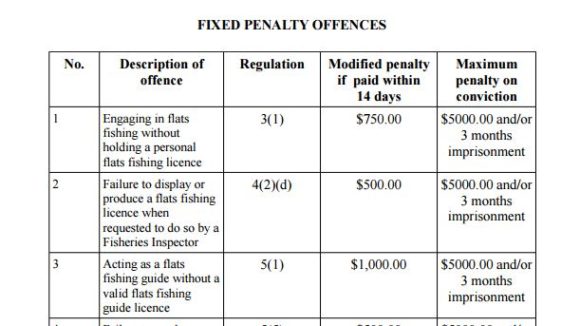
Native Bahamians are required to buy a license to fish the waters right in front of their own homes.
Everything is catch and release with a limit of one in possession, which, of course, is not catch and release. (UPDATE – I think I got this one wrong. Similarly to how Florida struggled with the definition, this just means you can be holding one for a photo, so the fish is in your possession, but you don’t keep it.)
To make matters worse, the proposed regs enshrine the place of power of the Bahamas Fly Fishing Industry Association, run by Prescott, who should be disqualified from being 100 feet from anything involving fly fishing based on how poorly he’s handled this whole thing.
I’m hearing stories of independent guides really hurting as anglers just go other places. This isn’t going to help. This is the dumbest bunch of regulations in one place, at one time, in the modern history of the Bahamas.
I cannot imagine that the average Bahamian has any idea of the power play going on here, or how their lives and businesses would be impacted by this. The place I visited on Abaco earlier this year would be pretty much shut down and that family would lose at least 50% of the income they get from tourists, if not more. I bet they haven’t been consulted here. They would be blind-sided.
You can’t promote your industry by threatening your primary customers with three months in jail. Who does that?
I’m not sure who you can write or complain to at this point. I’d urge you to maybe give a call to your Bahamian friends, the places you stay, the business you frequent, and tell them that something evil this way comes and the hurt is only just beginning.
This would be a disaster.
stakeholders and Interested parties
Please see the attached draft regulations for theFly Fishing industry.I am directed to forward the attached draft for yourviews and/or comments (if any).I am to request any response on or before 19 May, 2016Angela AlburyMichael T BraynenDirectorDepartment of Marine ResourcesP O Box N 3028Nassau, BahamasTel 242- 393-1777Fax 242-393-0238To help ensure that I get your email messages, copy to michaelbraynen@yahoo.com
Resorts World Bimini wanted to bring rapid ferry service to Bimini to bring allllll sorts of flashy, cash-dripping Americans over to their resort.
Locals said “It isn’t going to work.”
Environmentalists said “It isn’t going to work.”
The Bahamian Administration said “I can’t hear you over the sound of all this money.”
Guess what? Resorts World Bimini got their ferry and their ferry terminal (at some high environmental costs).
And guess what happened next! Yup… the ferry has failed and the service has stopped.
The Bahamian people appear to be on the hook for this bit of douchbaggery.

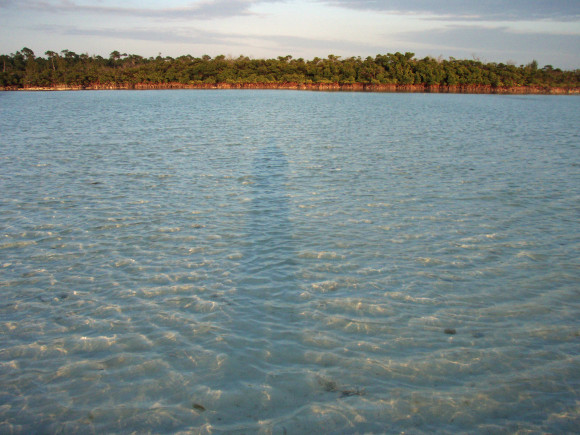
A thing of the past maybe
The first glimpse of what the BFFIA was planning got out and freaked a lot of people out. After the initial freaking out they went a little quiet. They just released Version 2.0 and it hasn’t gotten any prettier.
Here are the highlights:
There is more talk about conservation in this proposal, but it is clearly all about cementing profit and power, mostly power and almost totally in the hands of the BFFIA.
If you want to understand the nationalist, xenophobic mindset this stuff is coming from, I suggest watching this video. This is pretty classic “with us or against us” type stuff. In this case, Americans, the clients and tourists are the “them” along with anyone who questions the party line.
So, the march off the cliff continues and I can tell we anglers, we clients, we vacationers and tourists, we are wearing down under the grinding persistence of the bad news. Hell, I don’t like sounding like Chicken Little, but the sky kind of is falling.
The Bahamas has been a wonderful place and attitude and way of life for so many of us, but that is all under threat. Nothing says “Relax” quite like “National Game & Wading Wardens.” WADING WARDENS! Right?
What an effing disaster.
To all those Bahamians who say “What right do you have to say anything about what we do in the Bahamas?” Well, if we were passing a law saying Bahamians coming to Florida had to be accompanied by a licensed tour guide and only 50 Bahamians at a time could be in Miami… well… it might be a law passed in the US, but I’d think you might take offense, and rightly so. These laws are aimed at Americans (and sure, Europeans), so expect us to voice our concerns. We aren’t invading or anything (at least not unless Trump gets into office… then all bets are off, that guy’s crazy and has an eye for real estate), but we might have something to say about this giant Bahamian middle finger.
Not much left to do at this point but hope sanity reigns in the Cabinet. Reasons for hope on that front are not abundant. The BFFIA is doing everything it can to consolidate power and authority and at least the Ministry of Fisheries seems to be totally on board.

Here is the full text of the proposal:
Conservation: – Major nursery systems of Mangroves and Flats throughout The Bahamas need to be protected. Examples being the Northside of Grand Bahama, West Coast of Andros, the Joulters Cays, Bights of Acklins and Crooked Island, Westside of Abaco, Eleuthera, Long Island and Cat Island etc. This is imperative that these Mangrove habitats and flats are protected, especially Red Mangroves, as it is the primary nursery system where the juvenile fish and crustaceans grow and find protection from the predatory fish. This will increase the fish population from depletion or extinction for the continued enjoyment of Anglers and generations to come. No commercial mining or drilling of any kind should be allowed in the flats. These areas should be passed by Law as Marine Reserves. A Management Plan needs to be implemented which focuses on the opening of many blocked creeks around the Bahamas, repairs and building of boat ramps, Game Wardens Program, Wading Warden Program (responsible for manning the zoned Unguided Anglers (UGA) Flats ensuring proper handling and care of the bonefish, tarpon, permit, snook and stingray, no netting or littering), funding local children conservation educational programs and field trips and the proper handling and care of the “Catch & Release” species by Guides and Anglers. It is recommended that all mangrove, flats and reef research should be done through The College of the Bahamas in consultation and in conjunction with BFFIA. BFFIA suggests that 40% of the Fishing License Proceeds go to conservation and that a Board Member of BFFIA be appointed as Board Representative on the Government Conservation Fund Committee.
Fishing Licenses: – Fishing permits should be sold electronically and purchased via credit card or through the Department of Marine Resources, the Family Island Administrator’s Offices, Fly Shops or Lodges. Fly Shops and Lodges should be able to purchase Daily and Weekly Licenses in Bulk at a discounted rate and be able to sell to the Anglers, like we do now with Batelco Phone Cards, and send in the filled in applications to the Department of Marine Resources for their records. Persons who have a vacation home in The Bahamas should be able to purchase a year fishing license for the owners of the house. This is not for use by guests visiting their homes. BFFIA suggests that there be two (2) Categories of Fishing Licenses, Guided and Unguided. This will also assist with more accurate surveys and statistics as to the percentages of Guided and Unguided Anglers frequenting our Country’s Flats and not rely on secondhand surveys or information from Non-Bahamian Entities’ Reports. The proposed fees are as follows:
W/Guide $10 W/O Guide $20 Day
W/Guide $50 W/O Guide $100 Week
W/Guide $100 W/O Guide $200 Month
W/Guide $250 W/O Guide $500 Year
Foreign Vessels or Floating Lodges: – A Foreign Registered Vessel (needs to be defined) fishing in Bahamian waters with single or multiple flatsboats be required to purchase a sportfishing permit also for the flatsboats and a fishing license for every Angler on board. They would also be required to hire a Certified Bahamian Guide at a ratio of one to two, that is one guide to every two Anglers.
Certified Fishing Guide be employed at a ratio of one(1) to two(2), namely one guide to every two Anglers fishing in the flats.
Number 5 (2) (c): – In the Draft Legislation where is it talks about Certification of Guide and operators. It need to state “successfully completed the fly-fishing Certification program offered by BFFIA for a minimal fee.
Certification of Guides: – The legitimizing of the Fishing Guide Profession for Bahamian Citizens only. The reason being that Immigration status like permanent resident with the right to work and others have and are still being abused, especially in the commercial fishing sector. Currently foreigners are only marrying locals to have access to our Natural Resources while they continue to hold on their primary residence in their country with no allegiance to the Bahamas. General Guide License and Master Guide license should be obtained from The Department of Marine Resources, following the certification of the Bahamas Fly Fishing Industry Association. Current professional Guides, with five years or more experience should be grandfathered in, with new Guides undertaking the certification program, which would include a minimum of a year apprenticeship on the flats with a professional Guide. They would also be required to have Liability Insurance.
Certification of Lodge Operators: – The certification of lodges should be done by the Bahamas Fly Fishing Industry Association and the Ministry of Tourism Hotel licensing unit. BFFIA recommends that Foreign Investment Board should consult with BFFIA, who will discuss with members and relevant stakeholders, to evaluate the current lodge density in the proposed area to avoid over fishing and irreparable damages to the already fragile local fishery. A major concern is that Bahamians who are presently in the industry, have been placed at a very unfair disadvantage and competition, due to not having access to capital compounded with high interest rates from our local banks whereas foreign persons do not encounter these issues. The present lodges here in The Bahamas should be grandfathered in, but any Lodge going forward should be majority Bahamian owned and the Industry reserved for Bahamians.
Duty Free Exemption Fishing Lodge Operators: – The BFFIA recommends that Certified Guides should also be able to apply to the Department of Marine Resources/Minister of Finance for customs duty exemption for Boats, Trailers, Engines, Trucks, Jeeps or SUVs, Kayaks, Stand Up Paddle Boards (SUP), fly fishing gears and related supplies, so that it would improve the capability of Guides to deliver the highest level of service and safety to the Anglers.
Outfitters’ License: – Recommends that Bahamian Fly Fishing Lodges and Certified Fly fishing/flats fishing Guides who meet all the Government requirements and licensing be issued an Outfitters’ License. This would allow lodges and Certified Guides to have fly shops with the basic gear that Anglers needs on their fishing trips. Often Anglers come on a trip and find in many cases they don’t have the correct gear. Example sometime they forget their foul weather jacket, or wading boots, or the wrong fly line etc.
Prohibited Commercial Fishing in the Flats: – No commercial fishing or netting of Bonefish, Tarpon, Permit, Snook or Stingray be allowed in the flats.
Protection: – BFFIA recommends the protection of Tarpon, Permit, Snook and Sting-Ray with further strengthening of the present protection of Bonefish in the current Act. Also the need for Catch and Release practices and protection of our National Fish, the Blue Marlin (Could you imagine a Bahamian visiting the USA decides to hunt and kill the Bald-Headed Eagle. Imagine a Sovereign country where the national fish is not protected for catch and release).
DISTRIBUTION OF FISHING LICENSES: – BFFIA recommends that the fishing license fee should be distributed as follows:
40% Government
40% Conservation fund
15% Bahamas Development Bank in a special fund to help Bahamians presently and are interested in getting in to the fly fishing business. Presently a minimum of 70 percent of Bahamians are not able to make their bank payments.
5% BFFIA
National Game & Wading Wardens: – BFFIA recommends establishing a National Warden Program throughout the Country to assist in the enforcement as it relates to fishing without the proper Government Licenses, handling and care of the protected flats species, and the illegal Netting of Bonefish namely in Long Island, Andros, Acklins along with other illegal activities on the flats. A portion of the funds from the fishing license can be used to train and pay for these wardens and ensure that they are properly equipped and have access to speed boats and flatsboats for patrol etc.
Unguided Anglers (UGA): – To zone areas for Anglers with a Fishing License to fish without the assistance of a Certified Guide. (At their own risk and accepting full liability). These zoned areas must be assigned with consultation with the Local Guides and Lodges on each island because of their unique geography and usage placed on a rotation schedule to prevent overfishing .e.g. if an island has 3 zoned Unguided Anglers’ (UGA) flats one in rotation should be closed every 6 or 9 months. Islands like Long Island, Eleuthera, Cat Island, Exuma, Acklins and Crooked Island need special protection because of their the geography, the roads are constructed on the side of the islands directly on the flats, which exposes and makes the fishery very vulnerable for abuse to over fishing. UGA, because of the easy access, should not be allowed to fish these islands especially due to the limited flats, increased wading traffic and the already applied pressure on the fishery to avoid the already depletion of the fish population. Anglers should be permitted to fish on feet (wading) providing they are staying in a local fishing lodge. Their fishing license should allow them to wade on a flats near the lodge to fish. There are genuine cases where such facilities who cater to Anglers who like to fish by themselves, should be permitted, as long as they are staying at a licensed fishing lodge. Persons who have a legitimate vacation home in the Bahamas should be eligible to purchase a long term fishing permit which allows them to fish the flats. Under no circumstance, should that allow them to run an illegal business in The Bahamas from their residence. This is no different from a Mothership’s (Floating Lodge) operation on the water, where they bring in their flats boats and foreign Guides.
Again we, the Bahamas Fly Fishing Industry Association Board, would like to thank you for allowing us to voice the collective views of our members and stakeholders.
Respectfully,
Prescott Smith- President/Director
Denward Rankine- Vice President/Director
Valentino Munroe- Asst. Treasurer/Director
Shawn Leadon- Director
Kendall Williamson- Director
Nathaniel Gilbert- Director
Paul Pinder- Director
Omeko Glinton- Director
James Smith- Director
Colin Cartwright- Director
Philip Wiiliamson- Treasurer
Geneva M Wilson
Secretary
Kate Williamson
Assistant Secretary
Bahamas Fly Fishing Industry Association
Nassau, Bahamas